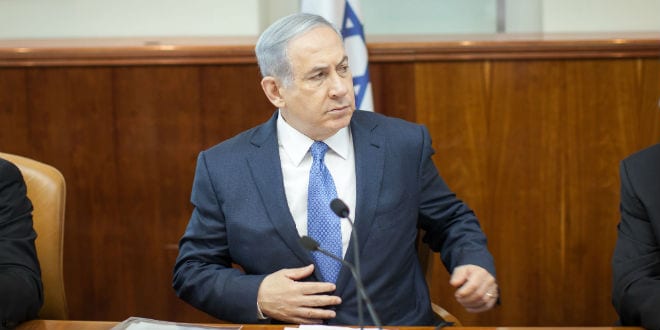As global powers are set to gather in Switzerland on Monday to resume nuclear negotiations, here in Israel the prime minister is warning that the new deal “paves Iran’s way to the bomb.”
Prime Minister Benjamin Netanyahu told a delegation of visiting US senators in Jerusalem on Sunday that the P5+1’s bad deal with the Islamic Republic is a major concern for Israel and other Middle Eastern countries.
“We are very much concerned for our common interests by the developments in the Middle East,” Netanyahu told the senators, who are on a visit led by Sen. Mitch McConnell (R-KY).
“As we are speaking, Iran is rampaging through Yemen; it is conquering the Middle East. This is seen by all countries in the Middle East as a strategic move to dominate the region and therefore we are witnessing something quite unprecedented.”
Netanyahu questioned by Western powers negotiating with Iran are not taking into account the current aggression and uprisings the country is supporting in nearby Yemen.
“And as Israel and the Arab countries see Iran progressing with its aggression to conquer Yemen and the Bab el-Mandeb straits, talks continue as usual and go on, on a deal that from everything that we hear paves Iran’s way to the bomb.”
Earlier on Sunday, at the beginning of the weekly cabinet meeting, the prime minister said that the emerging deal was worse than Israel had initially feared. “The Iran-Lausanne-Yemen axis is very dangerous for humanity and must be stopped,” he stated.
Negotiators from the US, United Kingdom, Russia, China, France and Germany will attempt to resolve issues that still remain with Iran on Monday. Both Western and Iranian officials are scrambling to meet a March 31 deadline.
A senior Iranian negotiator told AFP that certain outstanding issues have yet to be dealt with. “No deal has been reached, and the remaining issues have to be resolved,” he said.

One of the major issues yet to be resolved is the number of centrifuges Iran will be allowed to operate. Iran is said to be considering further cuts to its uranium enrichment program. However, the Islamic Republic is not budging on how long it must limit its access to technology that could be used to make nuclear weapons.
During a break from talks, US Secretary of State told media present in Lausanne, “It’s going all right. We’re working.” His French counterpart, Frank-Walter Steinmeier, said that talks were in the “endgame.”
Israel’s Interior Minister, Gilad Erdan, expressed optimism that there could still be time to influence the terms of the final deal, which had a deadline set for the end of June.
“It’s true that a deal is close, and there is a chance that an agreement on basic principles will be reached in the coming days,” Erdan told Army Radio. “But until the final agreement, which is supposed to be signed with Iran by the end of June, there are still a wide range of diplomatic options.”
“If, God forbid, it happens, Israel will also be required to reassess the whole resulting security situation,” he added.




